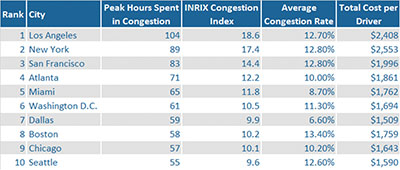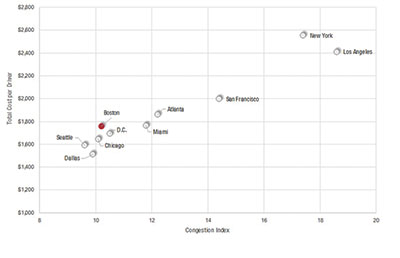A strong Boston economy means more traffic (2.0) - by Liz Berthelette

Traffic congestion remains a hot topic in Boston. As a follow up to our December 2016 blog post titled “A strong Boston economy means more traffic,” where NAI Hunneman’s research department examined the correlation between increasing commuting times and strong economic conditions, this post will highlight the potential costs of greater congestion.

Boston is known to have some of the worst traffic congestion in the country and INRIX’s new 2016 Traffic Scorecard highlights just how congested this city is. Globally Boston is the 16th-most congested city with 58 peak hours spent in congestion. Compared to most metropolitan cities, Boston is on the smaller side with respect to population and size of the city. When comparing Boston’s population density throughout the nation, Boston is ranked 51st and taking into account the fact that the Massachusetts residents have access to an extensive commuter rail system and two interstate highways that go directly into the city, one would not expect there to be as much congestion as there is. Yet, Boston ranks 8th in peak hours in congestion (58 hours) and 3rd in average congestion rate (13.4%) among all major North American cities.
While traffic can be frustrating to commuters, there are both direct and indirect costs associated with this increased congestion. Direct costs include the value of fuel and time wasted in congestion while indirect costs include the increase in prices to households from freight trucks sitting in traffic. As expected, Boston ranks 6th in the country with a total cost per driver of $1,759 annually.
The graph below highlights the 10-most congested markets in the U.S.; comparing total cost per driver against INRIX’s congestion index. New York and Los Angeles outpace the rest of the pack by a wide margin.

Not only does Boston land on INRIX’s top 10 list, but the city is also home to one of the most congested corridors in the U.S. According to the report, I-93 Northbound (from exit 5A/MA-24 to Exit 16) ranked 4th among the 10-worst corridors in the country. The morning commute appears to be the most congested. Northbound average morning speeds were only 27.7 mph while evening speeds were 43.5 mph. Total hours of delay per year reached 72 hours on this stretch highway.
While a sign of positive economic growth, the cost of congestion in Boston remains a risk worth keeping an eye on.
Liz Berthelette is director of research at NAI Hunneman, Boston, Mass.
Newmark negotiates sale of 10 Liberty Sq. and 12 Post Office Sq.

How COVID-19 has impacted office leasing - by Noble Allen and John Sokul

Five ways to ruin a Section 1031 Like-Kind Exchange - by Bill Lopriore

Make PR pop by highlighting unique angles - by Stanley Hurwitz









